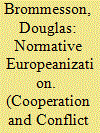| Srl | Item |
| 1 |
ID:
097796


|
|
|
|
|
| Publication |
2010.
|
| Summary/Abstract |
In this article, the concept Normative Europeanization is developed from a synthesis of Normative Power Europe (NPE) and Europeanization. It is argued that NPE has focused too narrowly on the external relations of the European Union (EU), while Europeanization has focused on changes in policy structures. The synthesis developed here overcomes these shortcomings by emphasizing normative internal relations within the EU. Normative Europeanization is defined as a top-down process based on the logic of appropriateness, where states with a close relationship to the EU, i.e. candidate and member states, develop a commitment to a European centre and their normative point of departure is changed. It is argued here that a process of normative Europeanization affects candidate countries and new EU members especially where pro-European norms are diffused through different mechanisms. The theoretical argument is illustrated through a case study on Swedish foreign policy reorientation during the 1990s. The empirical analysis is structured around two ideal types: internationalist foreign policy and normatively Europeanized foreign policy. Based on this analysis, it is concluded that Swedish foreign policy has undergone strong normative Europeanization.
|
|
|
|
|
|
|
|
|
|
|
|
|
|
|
|
| 2 |
ID:
119228


|
|
|
|
|
| Publication |
2013.
|
| Summary/Abstract |
This study analyses to what extent a change of government in times of unchanged international structure affects the ideology of foreign policy. The main contribution is to investigate the role of political culture, as reflected through institutional design, as an intervening variable. Effects of changes of government in the United Kingdom in 1997 and 2010 and in Sweden in 1994 and 2006 is studied by analysing speeches in the General Debates of the UN General Assembly. The analysis is based on four ideal types. The results indicate that institutional design is an influencing intervening variable of foreign policy ideology. In the UK, a country dominated by majoritarian institutional design, foreign policy ideology changes more extensively in times of government change than in Sweden, a country dominated by consensual institutional design.
|
|
|
|
|
|
|
|
|
|
|
|
|
|
|
|